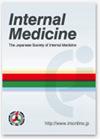Enlargement of Gastric Hyperplastic Polyps Arising from Helicobacter heilmannii sensu stricto-infected Mucosa after the Successful Eradication of Helicobacter pylori and the Long-Term Use of a Proton Pump Inhibitor.
IF 1
4区 医学
Q3 MEDICINE, GENERAL & INTERNAL
引用次数: 0
Abstract
Helicobacter pylori eradication is effective for the regression of gastric hyperplastic polyps (GHPs). We report a case which demonstrated an enlargement of GHPs after H. pylori eradication. The patient, who received long-term proton-pump inhibitor (PPI) therapy, lived with a dog, a natural host of Helicobacter heilmanii sensu stricto. Gastric colonization with Helicobacter heilmannii s.s. was observed after H. pylori eradication, thus suggesting the involvement of non-H. pylori Helicobacter species (NHPHs) infection for the enlargement of GHPs, in addition to the proliferative effects of PPI use on the gastric epithelium. Screening for NHPHs may be necessary in dog lovers to avoid paradoxical responses to H. pylori eradication.
成功根除幽门螺旋杆菌并长期使用质子泵抑制剂后,由幽门螺旋杆菌感染黏膜引起的胃增生性息肉增大。
根除幽门螺杆菌对胃增生性息肉(GHPs)的消退很有效。我们报告了一例幽门螺杆菌根除后胃增生息肉增大的病例。该患者长期接受质子泵抑制剂(PPI)治疗,与一只狗生活在一起,而狗是严格意义上的黑曼氏螺旋杆菌的天然宿主。在根除幽门螺杆菌后,观察到胃中有黑曼尼氏螺旋杆菌定植,这表明除了使用 PPI 对胃上皮细胞有增殖作用外,非幽门螺杆菌螺旋杆菌(NHPHs)感染也是导致 GHPs 增大的原因之一。可能有必要在爱犬人士中筛查非幽门螺杆菌,以避免对根除幽门螺杆菌产生自相矛盾的反应。
本文章由计算机程序翻译,如有差异,请以英文原文为准。
求助全文
约1分钟内获得全文
求助全文
来源期刊

Internal Medicine
医学-医学:内科
CiteScore
1.90
自引率
8.30%
发文量
0
审稿时长
2.2 months
期刊介绍:
Internal Medicine is an open-access online only journal published monthly by the Japanese Society of Internal Medicine.
Articles must be prepared in accordance with "The Uniform Requirements for Manuscripts Submitted to Biomedical Journals (see Annals of Internal Medicine 108: 258-265, 1988), must be contributed solely to the Internal Medicine, and become the property of the Japanese Society of Internal Medicine. Statements contained therein are the responsibility of the author(s). The Society reserves copyright and renewal on all published material and such material may not be reproduced in any form without the written permission of the Society.
 求助内容:
求助内容: 应助结果提醒方式:
应助结果提醒方式:


